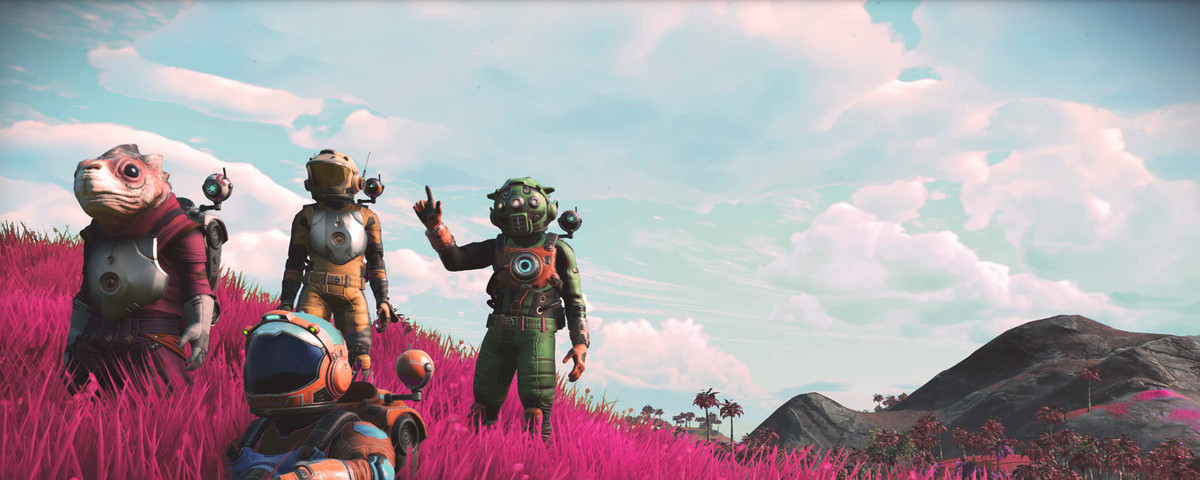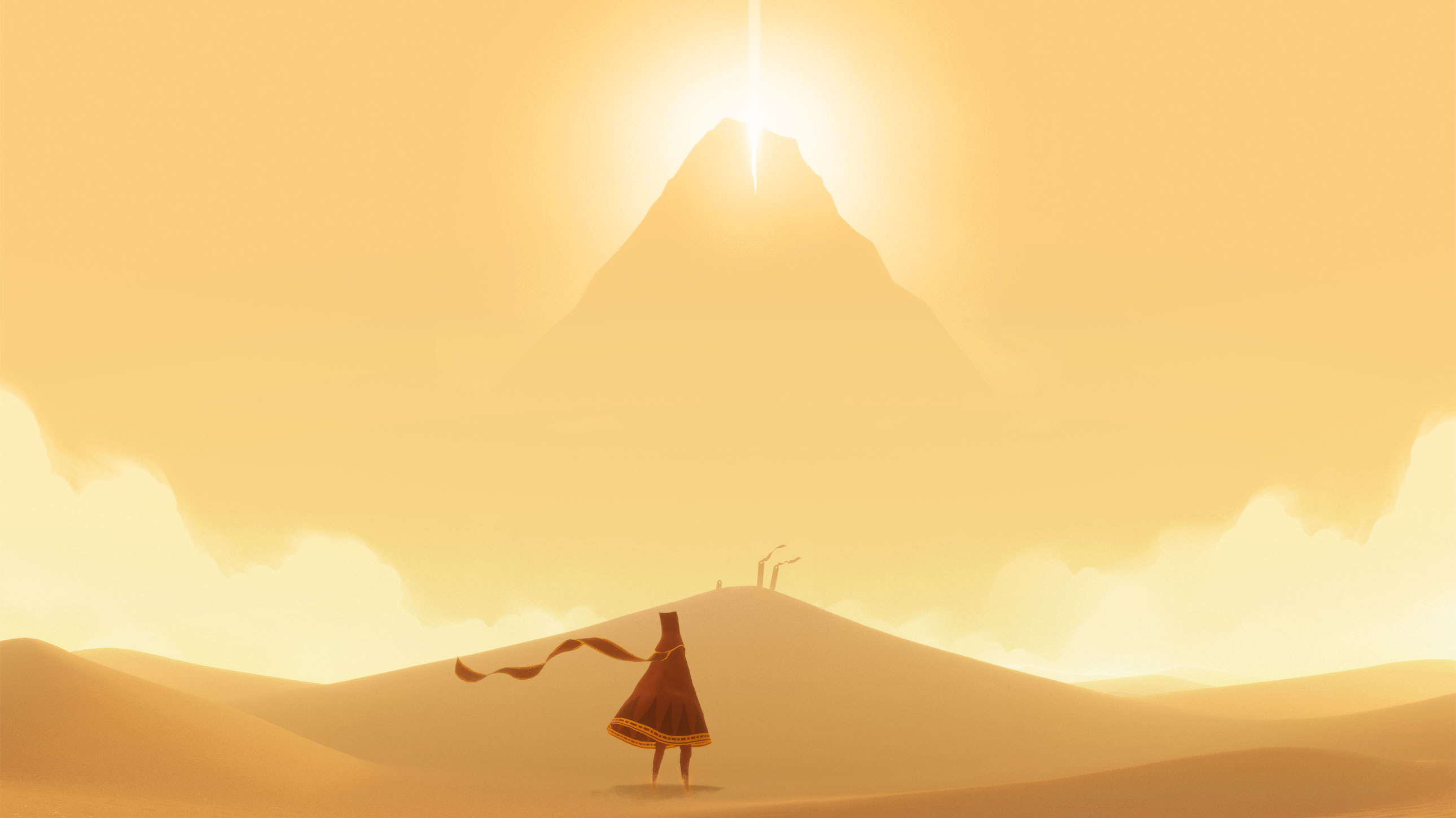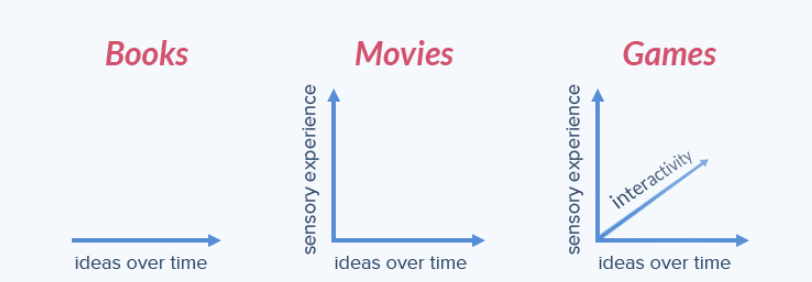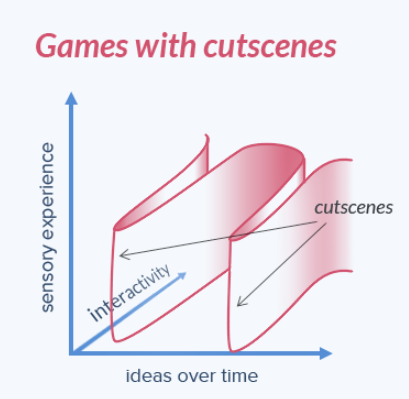Emergent Storytelling & Open World | How do Open Worlds tell stories in an emergent way?

Gjemel Likaj 13.06.2019
Hello everyone. Todays blog entry is going to be about the two main topics „Emergent Storytelling“ and „Open World“, with the question: „How do Open Worlds tell stories in an emergent way?“. To answer that topic I’ll first talk about the topics themselves and explain them on different examples.
Emergent Storytelling:
So, emergent storytelling is basically the narrative the player creates on his own, which is influenced by the own actions he makes in this world.
The game itself doesnt really give an explicit story, motivations or goals for the player. The player should build his story from his own imagination and should act out of his own motivation to explore the world and interact with it. Emergent storytelling goes along with the player story, because the player story influences the way the player acts which leads to different results. These two things work in a cycle with eachother. The system itself gives a really complex game model, which includes the world, the mechanics, the organisms and a lot more. But in the end it depends on the player what he does with the system and how he perceives it.
Procedurally generated worlds are great opportunities for emergenty stories, because these worlds are unpredictable and unique. Every world provides new opportunities for exploration, new things to discover and perceive; a world waiting for interaction from the player to create an own story.
Now I will explain all of this with differet examples, the first being „No Mans Sky“.
„No Mans Sky“:

No Mans Sky’s universe consists of procedurally generated worlds; it means that the universe basically creates itself. The game provides 18.446.744.073.709.551.616 unique planets and thus unique experiences. As soon as the first numerical seed is entered, the whole universe is set; the stars, the planets, the organisms, how they look, where they are at, how they behave etc. Changes in the universe would only happen through outer influences, in this case it would be the player. However, even things that the player currently can not perceive take their course, like animals on a planet far away drinking water and living their life. In most games you already have to choose your character in the beginning of the game, even though you did not decide how you want to play yet or just could not decide how you would like to play in the end. This problem doesnt exist in „No Mans Sky“ since you can not choose a character to play with, so you cant hide behind its alter ego. You act out of own interest and motives.
For example did many of the players ,that played „No Mans Sky“ for the first time and landed on an unknown planet, instantly shoot down the first alien they saw. They felt bad afterwards because the game does not reward doings like this. You decide on your own that you want to do this. Because of this Design „No Mans Sky“ offers a big room for own imagination. The player can decide what kind of creature he wants to be and how he wants to interact with the world; a hero, a villain… that is up to the player. Now the 2nd example „Journey“.
„Journey“

Journeys explicit story is really loose, you get thrown into the world with little to no knowledge at all. When starting the game the only thing you can determine is that you are some person or creature in a desert. The game itself does not give any explicit narrative that gives the player goals, motivations, a plot, conflicts or dialogue. These aspects emerge from the design of the game itself. In the beginning you see a giant, beautiful beam of light on top of a moutain in the far distance. Conciously or unconciously it becomes your goal to get there and the journeys the players experience are all unique. Some players encounter other ones with whom they solve different kinds of riddles, develop friendships and journey together whilst other players have conflicts with others and prefer travelling alone.
An example scenario would be the following: Imagine yourself in the wilderness, trapped at the bottom of a cliff. You are struggeling to get out of there. After a lot of tries, a stranger finally found you and helps you getting out of that cliff. You become friends and exlpore the world of „Journey“ together. After some time you cross a bridge but your friend gets knocked off of it because of a really hard blast of wind. You yell for him, mourning your loss… you think you are never going to see your friend again… BUT THEN you start hearing his voice out of the depth. You decide to go on the journey to save your friend, like he did previously. After saving him you both get safely to the end of „Journey“.
This scenario is like something out of a movie, though the experience is even stronger/better because everything that happened actually happened to YOU. What happened was not scripted by a story writer who set everything up. The story developed out of the players actions. You developed a real connection to the other player, felt emotions, loss or joy. If all of that would‘ve been scripted, it would not have felt natural. How much focus this game puts on „emergent Storytelling“ gets pretty clear through its ending. When you get to the top of the mountain and touch the lightbeam, you fly through the whole world you just explored and all its different areas. My interpretaion is that reaching the light beam was not the actual important thing of the game, rather the journey you experienced on your way there, that varies from player to player.
What makes storytelling good?
First of all I have to clarify that the following points are all subjective and not facts.
When talking about storytelling you have to differentiate between book, movie and game stories. In books depth comes from the words read. In movies another layer of depth gets added through seeing and hearing. And in games another layer gets added through interactivity. The player experiences the story in first-person, you play as the protagonist. This gives the opportunity to project the motivations and emotions of the protagonist on yourself and you see and hear things by exploring the scene, not by some camera man that leads us through the scene.

Additionally you have to distinguish between a good story and good storytelling. The defining feature of games is the interactivity that the player experiences. In most narrative-driven games you get thrown between cutscenes and gameplay. This is an example of bad storytelling. Games that tell their stories would be for example Uncharted, Tomb Raider and Batman: Arkham City.
Even though these games have a great story, their storytelling is just bad because they dont really use the medium „game“ that well. The reason why this is simply bad is because the players immersion gets broken when he gets into cutscenes since the point-of-view switches from 1st person, in which you played the protagonist, to 3rd person, in which you just watch whats happening like in a movie.
The three main aspects of bad storytelling are ludonarrative dissonance, dissonance of identity and the dissonance between narrative mode and game mode.
The ludonarrative dissonance describes the conflict between narrative and gameplay. For example playing a character that is meant to be a really honourable hero that would never kill civilians but then be given the opportunity to do so with the mechanics. The narrative can not be taken seriously because the story does not match with the experience the player makes.
The dissonance of identity describes the inconsistence of the storytelling related to the character. In one moment you are the protagonist of the story and experience everything first-person and in the other moment you get pulled out of that role and see how your character moves and interacts on its own. The importance of your own doings get diminished when the game itself makes the important decisions.
The dissonance between narrative mode and game mode refers mainly to the cutscenes of the game. In one moment you play a game and in the next one you are watching a movie. This art of storytelling breaks the immersion and tension that has built up during the gameplay.
An example scenario would be the following. Imagine yourself in a really intense part of a story in which you are fighting for your life… every mistake could cost you your life. The stress you are feeling fits the theme the game is trying to convey… but then the camera zooms out and the cutscene starts. Even if the character is in an even more intense situation as in the previous gameplay, you do not bother as much because everything that happens is anyway part of the story.
In contrast, Half Life does a really good job, since the content of a scene is presented while you are playing, without any cutscenes, you never lose control oft he character whereby the point-of-view does not get broken at all. You are permanently the protagonist.

Finally good storytelling is achieved when what you are supposed to do, does not intervene with what you, as a player, want to do. The point-of-view does not get broken and the explicit story is indistinguishable from the palyer story. And the most important aspect: the player has to be permanently in interaction with the game.
Now lets get to the other big topic: Open Worlds.
Open world games provide a lot of freedom and different opportunities to play a game. The players movement is, for the most part, unimpeded and can explore everything. The decision when and how he wants to explore something lies with the player. Additionally the story course is not set by a specific order of levels and it is also divided into different segments. Mainqeusts, sidequests and tertiarquests. Mainquests have a direct impact on the main story. Sidequests dont have a direct influence on the story, but provide advantages for the player like additional loot he can achieve by doing them. Tertiarquests are mainly mini-games that do not have an impact on the story at all. Open Worlds also contain different kinds of simulations that react on actions of the player, for example NPCs of a town or animals in the wilderness. This offers the player even more activities. The goal of open worlds is tto tease the curiosity of the player to make him explore the world. For exploring he will often get rewarded with different kinds of items he will find.
„No Mans Sky“ for example provides a giant number of different planets that the player can explore, making its open world insanely big. Additionally the players movement is impeded by close to 0% on land, air or water. You can explore these planets with a jetpack, a spaceship or by swimming. You can even exit these planets on any time because you are not trapped inside of a skybox that limit these worlds. You can freely move around the whole universe and do whatever you would like to do. Everything you see can be explored, which teases the curiosity of the player even more.
Most of the players stop playing „No Mans Sky“ before they have seen 0.1% of the whole world, which is pretty sad on the one hand but fascinating on the other, that the creation of worlds (or universes) this big is possible.
Conclusion: How do Open Worlds tell stories in an emergent way?
In this conclusion I will mainly focus on the example „No Mans Sky“. The game itself does not really offer an explicit story. You play as an unknown creature on an unkown planet with no set goal. The first thing the player does is exploring the world out of pure curiosity. You encounter different unknown temples, creatures, landscapes and build your own story what happened in these specific places, what kinds of creatures they are, if they are friends or not; what you do with all of these information is up to your imagination. This open world gives the player an infinite amount of Information that vary from planet to planet, place to place, creature to creature and have different effects on different people.
Summarized, open worlds tell stories by not giving an explicit story to perceive but rather give a lot of information (through the world) that the player can use whilst he interacts with the given mechanics to create his emergent story.
Get Sherlock in Wonderland V0.5
Sherlock in Wonderland V0.5
Adventure Game
| Status | In development |
| Authors | Gjemel Likaj, Carla Rother, Sandro Purann, Cagatay.Aydin |
| Genre | Adventure |
| Tags | 3D, alices-wonderland, Atmospheric, dialogue, Exploration, riddle, sherlock |
Leave a comment
Log in with itch.io to leave a comment.